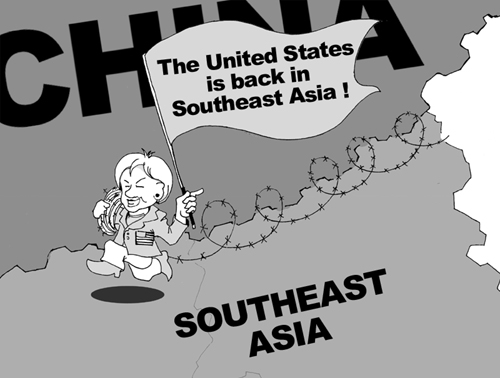Chinese tai chi vs. US boxing in Asia
The US decision to attend the East Asia Summit (EAS) in Vietnam later this week indicates its return to Asia by seeking a "regional counterweight to a rising China," which may raise the eyebrows of the world's largest developing country but receive mixed reactions from neighboring countries.
 |
|
Liu Pei/China.org.cn |
US Secretary of State Hillary Clinton will attend the EAS in Hanoi at the end of October, AFP reported.
It is the first time that Uncle Sam agreed to participate in the five-year-old summit, which groups major East and Southeast Asian countries together.
In a speech delivered in Hawaii in January, Clinton, who called for "smart power" in diplomacy, linked deeper US engagement in Asia to what she believed were region-al concerns. She says Washington acts as "a force for peace and stability, as a guarantee of security," as China's power rises.
The prospect of the US cementing alliances with all of China's neighbors is slim because stakeholders in Asia have different concerns and interests.
China has adopted a cautious attitude in its activities in the East China Sea and South China Sea, aiming to avoid conflicts with its neighbors.
However, it is easy to see the shadow of the US in the recent skirmishes over sovereignty.
Since China opened up more than 30 years ago, the Sino-US relationship has had its ups and downs, though the US created most of the trouble.
Most Chinese officials and scholars feel that the US is neither a friend nor a foe.
On the one hand, the continuing growth of China has driven Sino-US relations to evolve, forcing China to be more open and assertive in diplomatic affairs and regional geopolitics.
On the other hand, neither side can have its concerns addressed while leaving the other suffering a complete defeat because the bilateral relationship has never been a zero-sum game.
It is time for China to think seriously about the Sino-US relationship in the context of Asian affairs, which requires extraordinary patience and tolerance from the Chinese side.
Flexing its muscle, the US has jumped into the square ring in Asia to start a 12-round scrap with China, only to find the latter a different opponent than it thought.
When facing the challenges created by the US in Asia, China should remain sober-minded and learn to practice tai chi with the US.
Just like in tai chi, China can conquer the unyielding with yielding.
 0
0 







Go to Forum >>0 Comments